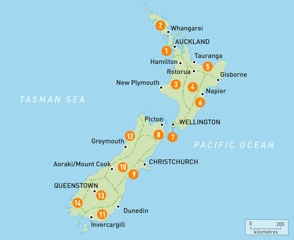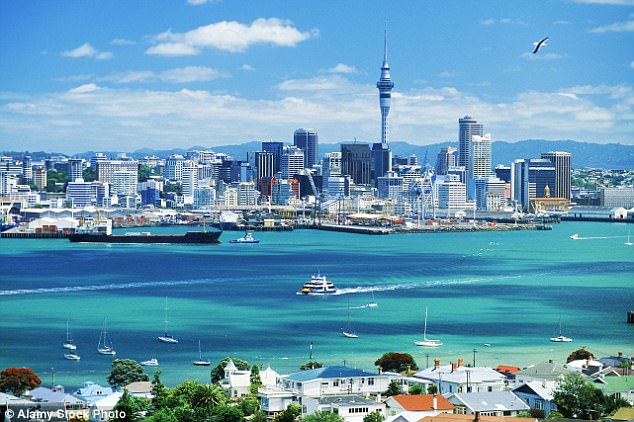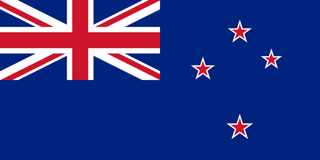New Zealand

New Zealand is a country of stunning and diverse natural beauty: jagged mountains, rolling pasture land, steep fiords, pristine trout-filled lakes, raging rivers, scenic beaches, and active volcanic zones.
If you are wondering whether New Zealand is the right destination to study for you to pursue further studies, doubt no more. New Zealand is fast becoming a first choice of international students who wish to get quality education at affordable cost. Here we outline some of the main reasons why international student population in New Zealand has grown tremendously in recent years.

The New Zealand education system, being recognized by the British education, offers high quality and world-class education with a perfect balance of theoretical and practical learning. The education providers of New Zealand are categorized under three main categories:
There are overall 8 universities in New Zealand, which are recognized by the government and have all gained an internationally respected academics and research standards. Anyone meeting the criteria of a university can easily apply to get into it as prescribed by the New Zealand Qualifications Authority (NZQA). The criteria for high level courses are higher compared to other courses, for e.g. Medicine and Dentistry.
Having a degree from New Zealand can actually raise up your expectations of having a better future in any other country.
Providing a wide range of courses, up to and including the degree-level, there are 20 polytechnics, many of which are called Institutes of Technology. Semester times are roughly equivalent to those for universities but the short courses may start pursuing anytime during the year.
There are over 800 private education providers in New Zealand who offer many short-term English Language courses for the students who are from abroad. Some private institutes also provide courses in business, computing and design.
People
Kiwis are some of the most amazing, loving, and welcoming people that you will ever meet. If you are a stranger, a native New Zealander is going to treat you like you are a friend. They are used to meeting new people, first because they travel a lot themselves, and also because a lot of people come to visit New Zealand as well. The culture on the islands is quite laid back and easy going, as well. So you’re not going to feel tense like you would if you went to a large city like London or New York City to study. There are just over 4 million people who reside on the country, and it is one of the safest places to live in the world. Another cool thing about the people is that there are so many different kinds of people. For being such a small country, the diversity is greater than you see in many European countries.
Weather
Nothing can get better than the weather in New Zealand. The winters are mild, with temperatures around 10ºC (50ºF) and slightly wet. In higher altitudes, you will see snow, but it’s not common in lower altitudes. In the summers, the climate is warm and dry with temperatures around 25ºC (77ºF). As you would expect in the southern hemisphere, the summer lasts from December to February; winter lasts from June to August. Spring and fall are similar, with cooler temperatures and little rain.
Educational system
This is the number one reason to go anywhere for school, but New Zealand is amazing for their educational system. First, the tuition is some of the lowest in the world. You get a British-based education (due to their British influences) for a percentage of the cost. The degrees are recognized around the world as being up-to-date and practical. You will get a high quality, hands on education that you deserve. The New Zealand even goes so far as to checking each and every course, program, and certificate for quality so that they can be recognized around the world as high-quality education. Not only that, but the support services for international students are among the best in the world. They have a lot of expertise and experience in helping international students so that they can succeed in their programs.
Work opportunities
There are plenty of work opportunities available for international students. On a student visa, you are allowed to work up to 20 hours a week through the semester; during vacations you can work up to 40 hours. So, instead of having to worry about finances, you get to supplement your education with income. You may even be able to nab internships and other practical work. The international studies office at your university can help you find a job to sustain you during your time in New Zealand. Another great thing is that you can get a permit at the end of your degree program and work for 12 months in the country under a special “work permit” that is alongside your student visa, which is what we’ll look at closer in the last point.
Ease of visa acquisition and residency
The visa acquisition process is incredibly simple, and unlike many other countries, you will not be rejected right away. You get to talk to people and tell them your side of the story if there is something that may prevent you from getting a visa to come into the country. If you can explain why you’ve decided to go down their and your international studies program helps you to create a Statement of Purpose (a statement you give to the visa officer to tell them why you are coming to New Zealand to study), you will usually get a visa. The country is welcome to immigration, more so than almost any other country in the world. The last advantage is that, after you graduate, as mentioned above, you can work in the country for up to a year. If the job you are working at is related to the degree that you received, you can actually apply to get permanent residency, which you will most likely get within 6 months of your application.



